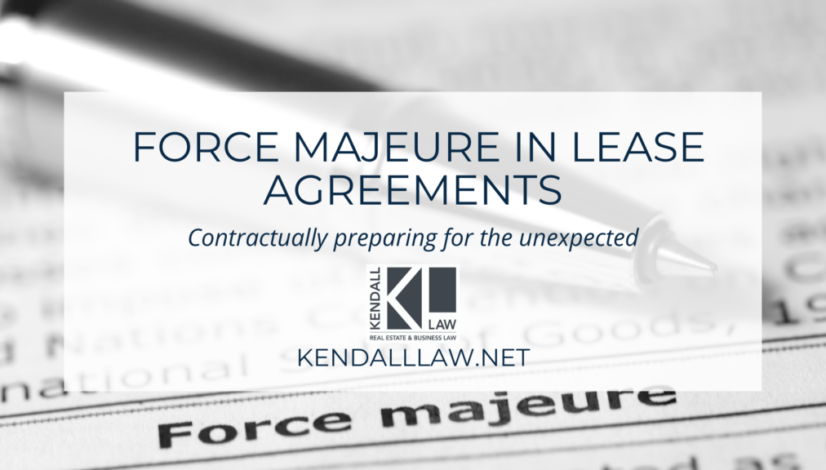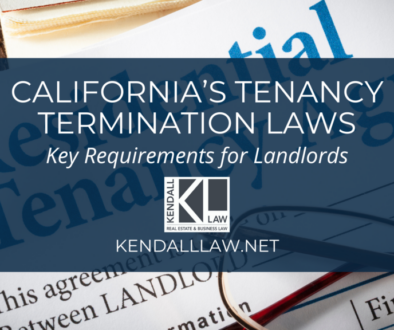A Closer Look At Force Majeure In Lease Agreements
Expect the Unexpected
A Force Majeure clause is commonly found in most contracts, including leases. The clause dictates that both parties signing the lease are absolved of fulfilling obligations in the onset of an extraordinary event, such as: wars, strikes, riots, or “acts of God.” Because of the COVID-19 pandemic, however, an interesting issue is arising where multiple cases are being brought up on the basis of force majeure in relation to pandemic restrictions. The following cases are just a couple examples that signify the importance of the force majeure clause and how tenants are trying to utilize the clause throughout the pandemic.
In Illinois, a restaurant was struggling to fulfill its obligation to pay rent due to the restrictions brought by Governor J. B. Pritzker’s executive order that prevented on-site consumption of food or beverage. The restaurant invoked the force majeure clause found within the lease as a defense for not paying rent. In Re Hitz Restaurant Group, the court found that the clause explicitly cited government actions or orders as excusable events.
“Landlord and Tenant shall each be excused from performing its obligations or undertakings provided in this Lease, in the event, but only so long as the performance of any of its obligations are prevented or delayed, retarded or hindered by … laws, governmental action or inaction, orders of government….”
Therefore, the restaurant’s defense stands.
In New York, a tenant exercised the force majeure clause to prevent the fulfillment of obligation to vacate the property because of government restrictions. The landlord argued that the specific language within the clause does not allow government restrictions as an excusable event under force majeure. Specifically, the landlord argues that the enumerated events within the force majeure clause are described as “acts of disorder” while government restrictions are events or acts of “law and order.” While the case, 850 Third Avenue Owner, LLC v. Discovery Commc’ns, is still ongoing at the time, landlords should take heed of the impact that the specific language listed within the force majeure clause can have on a case.
Perhaps the most important lesson here for landlords is being prepared to adapt to ever-changing circumstances. Before COVID-19, most contracts with a force majeure clause did not explicitly list out pandemics or government mandated shutdowns as excusable events. Now, landlords should strongly consider including a force majeure clause that broadly implements and addresses pandemics and events relating to them. Below is an example of a broad clause:
“If Tenant or Landlord is delayed or prevented from performing any of their respective non-monetary obligations under this Lease, and such delay is by reason of strike, lockout, labor troubles, material shortages, adjustment of any insurance claim, failure of power, riots, civil commotion, insurrection, war (whether declared or undeclared), warlike operations, acts of terrorism, cyber-attacks, acts of public enemy, acts of bioterrorism, plagues, epidemics, pandemics, outbreak of a communicable disease leading to extraordinary restrictions including quarantine or movement of people or goods, invasion, rebellion, hostilities, military or usurped power, sabotage, government action, rain and other inclement weather, acts of God, power outages, inability to obtain any material, utility, or service because of governmental restrictions, inability to obtain building permits, hurricanes, floods, earthquakes, tornadoes, or other natural disasters, accident, emergency, mechanical breakdown, municipal delays (including delays in reviewing materials submitted by a party or issuing permits or approvals following such submittals), the act or failure to act of the other party, the default under this Lease by the other party, governmental preemption in connection with a national emergency, any rule, order or regulation of any department or subdivision of any government agency, or any other cause reasonably beyond such party’s control (where lack of funds, inability to obtain financing, and/or changes in economic condition shall not be a basis for delay or prevention of any obligation under this Lease).”
While it is certainly impossible to completely future proof the clause, it is important to be adaptive to current events and adjust aspects of the lease when necessary. Fortunately, here at Kendall Law, our attorneys are equipped to advise and handle questions regarding the lease agreement and the force majeure clause. If you or someone you know needs legal counsel, contact Kendall Law today or call (310) 619-4941.
Author: Eileen Kendall





